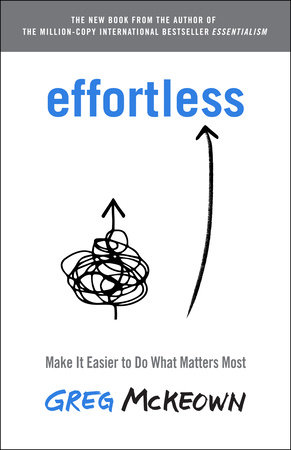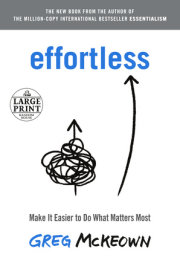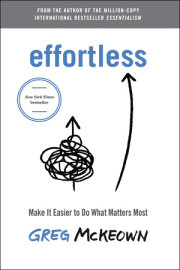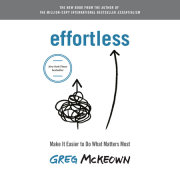Chapter 1INVERT
What If This Could Be Easy?
“Four a.m. and I’m up photoshopping pictures? Really?”
Kim Jenkins wanted to do what really mattered. But it was hard not to feel overwhelmed. For one thing, the university where she worked was undergoing an immense expansion. The client base had doubled in the last few years, but they were operating with virtually the same staff and resources as before.
With the expansion of the organization had come an expansion of complexity everywhere. There were new and difficult-to-decipher internal policies. There was a tedious new system for handling compliance. Processes had grown cumbersome, and now all of their projects and programs took more energy and time. Well-intentioned people had added but never subtracted. They had taken work that used to be simple and made it maddeningly, unnecessarily complicated.
As a result, the effort required to get her work done had become Herculean. And Kim had a tendency to be really hard on herself. She said, “I thought if I wasn’t putting in tremendous effort, sacrificing any time for myself, then I was being incredibly selfish.”
Then one day, it hit her. This was all so much harder than it ought to be. And with that realization, she said, “I could see it all for what it was: layers and layers of unnecessary complexity. I could see how it was expanding all the time and how I was suffocating underneath all of it.”
She decided it was time to make a change: When faced with a task that felt impossibly hard, she would ask, “Is there an easier way?”
She soon had the opportunity to put this method to the test when a faculty member called her and asked if she could have her videography team record a full semester of a class. In the past she would have jumped in with both feet, put her team to work for four months, and looked for ways to go above and beyond: adding music, intros and outros, and graphics. This time she wondered if there was an easier way to get the desired results. A brief conversation revealed that the videos were intended for a single student who couldn’t make every class due to a sports commitment. He didn’t need a highly produced recording with lots of bells and whistles; he just needed a way to avoid falling behind in his class. So she thought, “What if they simply asked another student to record those lectures on a smartphone?” “The professor was delighted with the solution,” Kim said. And it cost her just a couple of minutes of planning instead of months of work for her whole videography team.
Hard Work May Not Be Well Named
All too often, we sacrifice our time, our energy, and even our sanity, almost believing that sacrifice is essential in and of itself. The problem is that the complexity of modern life has created a false dichotomy between things that are “essential and hard” and things that are “easy and trivial.” It’s almost like a natural law for some people: Trivial things are easy. Important things are hard.
Our language helps to reveal our deeper assumptions. Think of these revealing phrases: When we accomplish something important, we say it took “blood, sweat, and tears.” We say important achievements are “hard-earned” when we might just say “earned.” We recommend a “hard day’s work” when “day’s work” would suffice.
Then there are the ways our language betrays our distrust of ease. When we talk of “easy money,” we are implying it was obtained through illegal or questionable means. We use the phrase “That’s easy for you to say” as a criticism, usually when we are seeking to invalidate someone’s opinion.
It’s curious to me how we default to sayings like “It won’t be easy, but it’s worth it” or “It’s going to be really hard to make that happen, but we should try.” It’s like we all automatically accept that the “right” way is, inevitably, the harder one.
In my experience this is hardly ever questioned. Indeed, if you do challenge this sacred cow, it can be uncomfortable. We don’t even pause to consider that something important and valuable could be made easy.
What if the biggest thing keeping us from doing what matters is the false assumption that it has to take tremendous effort? What if, instead, we considered the possibility that the reason something feels hard is that we haven’t yet found the easier way to do it?
The Path of Least Effort
Our brain is wired to resist what it perceives as hard and welcome what it perceives as easy.
This bias is sometimes called the cognitive ease principle, or the principle of least effort. It’s our tendency to take the path of least resistance to achieve what we want.
We don’t need to look far to see the principle in action. We buy something at the overpriced convenience store on the corner because it’s easier than getting in the car and driving to the store where prices are lower. We put our dishes in the sink instead of the dishwasher because one less step is required. We let our teenager text through dinner because it’s easier than inviting an argument by trying to enforce the no-phones rule. We accept the first, minimally credible information we find online about a subject because it’s the easiest way to get our questions answered. And so on.
From an evolutionary perspective, this bias for ease is useful. For most of human history it’s been crucial to our survival and progress. Just imagine if humans had a bias for the path of most resistance. What if our ancestors had been wired to ask, “What’s the hardest way to obtain food? To provide our family shelter? To maintain relationships within our tribe?” They wouldn’t have made it! Our survival as a species grows out of innate preference for taking the path of least effort.
What if, rather than fighting our preprogrammed instinct to seek the easiest path, we could embrace it, even use it to our advantage? What if, instead of asking, “How can I tackle this really hard but essential project?,” we simply inverted the question and asked, “What if this essential project could be made easy?”
For some, the idea of working less hard feels uncomfortable. We feel lazy. We fear we’ll fall behind. We feel guilty for not “going the extra mile” each time. This mindset, conscious or not, may have its roots in the Puritan idea that the act of doing hard things always has an inherent value. Puritanism went beyond embracing the hard; it extended to also distrusting the easy.
How to Try Too Hard
At a key moment in my career, a client at a high-profile technology company asked me to give three presentations on leadership. They told me that if all went well they were prepared to hire me for the next year or more. It was exactly the career break I needed. I understood their needs well. I had ready-made content they had already approved.
The afternoon before the first presentation, I decided to add some finishing touches. It already looked good. But I worried it didn’t look good enough. I decided to scrap it all and start over.
I got consumed with a new idea that I was convinced would wow them. I ended up staying up all night rewriting my whole presentation: new slides, new handouts, all of which were, of course, untested.
As I drove to the company’s offices the next morning I was exhausted. My mind was foggy. When I arrived, I was running on the fumes of my nervous energy.
As the presentation began, my stomach sank. My opening story was unpolished. The slides were unfamiliar; I kept having to turn around to see what was on the screen. One of the first slides failed to convey the point I was trying to make.
In short, I bombed. As I left, I was hyperventilating. I had been given this incredible opportunity, and I had blown it.
The client canceled the other two presentations. They did not hire me for the extended engagement. It was my most humiliating professional failure—ever.
I was burned-out from the experience, and I didn’t even walk away with the results I wanted.
As I reflected on how this had all gone so wrong, the answer was obvious. Nailing this presentation was so important to me, I had overthought it. I’d overengineered it. I’d tried too hard. And as a result, I’d snatched defeat from the jaws of victory.
Here is what I learned: trying too hard makes it harder to get the results you want.
Here is what I realized: behind almost every failure of my whole life I had made the same error. When I’d failed, it was rarely because I hadn’t tried hard enough, it was because I’d been trying too hard.
We are conditioned over the course of our lifetimes to believe that in order to overachieve we must also overdo. As a result, we make things harder for ourselves than they need to be.
Copyright © 2021 by Greg McKeown. All rights reserved. No part of this excerpt may be reproduced or reprinted without permission in writing from the publisher.















